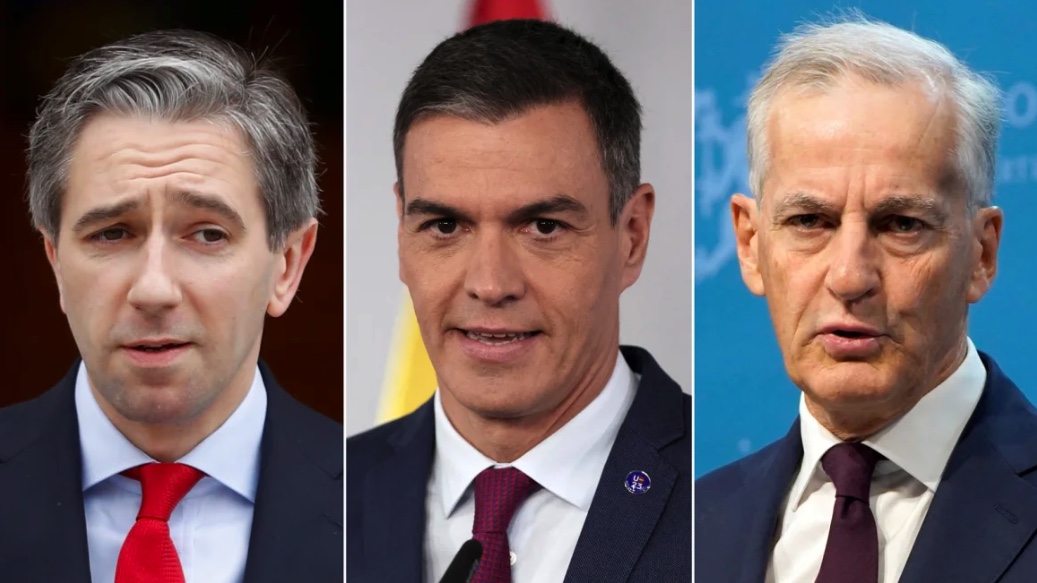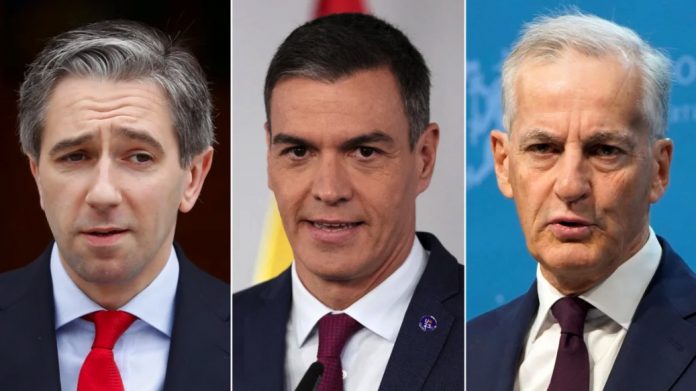ยุโรปต่อสู้กับปัญหาตะวันออกกลางมายาวนาน การยอมรับรัฐปาเลสไตน์ของไอร์แลนด์ สเปน และนอร์เวย์ เน้นย้ำถึงการเมืองภายในของตนมากกว่าสิ่งอื่นใด แม้ว่าการตัดสินใจครั้งนี้อาจมีผลกระทบทางการทูต แต่ก็ไม่น่าจะมีอิทธิพลที่สำคัญมากต่อนายกรัฐมนตรีของอิสราเอลเบนจามิน เนทันยาฮู เนื่องจากอิสราเอลตอบโต้ด้วยการเรียกเอกอัครราชทูตกลับประเทศและกล่าวหาว่าประเทศเหล่านี้ “ให้รางวัลแก่การก่อการร้าย” การอภิปรายเกี่ยวกับผลกระทบในทางปฏิบัติของการยอมรับสถานะรัฐของชาวปาเลสไตน์นั้นถูกต้อง แต่เดิมพันนั้นต่ำสำหรับประเทศในยุโรปส่วนใหญ่ ในไอร์แลนด์ สเปน และนอร์เวย์ การสนับสนุนดังกล่าวสอดคล้องกับความคิดเห็นของสาธารณชนและเผชิญกับการตอบโต้เล็กน้อย ในวันพุธที่ 22 พฤษภาคม ผู้นำรัฐบาลไอร์แลนด์ทั้งสามคน ได้แก่ รัฐมนตรีเอมอน ไรอัน นายกรัฐมนตรี หรือ ทีช็อก (taoiseach) ไซมอน แฮร์ริส และรองนายกรัฐมนตรี หรือโทนิสเต (Tánaiste) ไมเคิล มาร์ติน กล่าวปราศรัยกับสื่อระหว่างการแถลงข่าวนอกอาคารรัฐบาลในดับลิน ประเทศไอร์แลนด์ ในเรื่องของการยอมรับรัฐปาเลสไตน์ อย่างไรก็ตาม ประเทศเช่นเยอรมนี ฮังการี โปแลนด์ และสหราชอาณาจักรยังคงสนับสนุนอิสราเอล
ผลลัพธ์หลักจากการสนับสนุนทางทหาร ทำให้เกิดคำถามเกี่ยวกับการสมรู้ร่วมคิดในการทำสงครามกับกลุ่มฮามาส โดยเฉพาะอย่างยิ่งเกี่ยวกับการบาดเจ็บล้มตายของพลเรือน รัฐบาลสหราชอาณาจักรเผชิญแรงกดดันในการเปิดเผยคำแนะนำทางกฎหมายว่าการขายอาวุธให้อิสราเอลละเมิดกฎหมายระหว่างประเทศหรือไม่ ปัญหาเหล่านี้ส่วนใหญ่เป็นเรื่องภายในประเทศ รัฐบาลยุโรปมองตะวันออกกลาง โดยเฉพาะอิสราเอล ว่าเป็นความกังวลของสหรัฐฯ เนื่องจากมีกองทัพอยู่ในภูมิภาคนี้ อิทธิพลของยุโรปมีจำกัด และประเด็นในตะวันออกกลางได้รับความโดดเด่นเฉพาะหลังจากที่อาหรับสปริงกระตุ้นให้เกิดการย้ายถิ่นฐานจำนวนมากและความเสี่ยงด้านความปลอดภัย อย่างไรก็ตาม ชาวยุโรปให้ความสำคัญกับตะวันออกกลาง ไอร์แลนด์สนับสนุนปาเลสไตน์เนื่องจากมีประวัติศาสตร์การยึดครองของตนเอง และนอร์เวย์เป็นสื่อกลางในสนธิสัญญาออสโล
ในอดีตสหภาพยุโรปได้ให้ความช่วยเหลือด้านมนุษยธรรมจำนวนมากแก่ดินแดนปาเลสไตน์และสนับสนุนการแก้ปัญหาแบบสองรัฐ คณะกรรมาธิการยุโรปยืนยันความมุ่งมั่นนี้ โดยระบุว่า “สหภาพยุโรปมีความมุ่งมั่นอันยาวนานต่อวิสัยทัศน์ของรัฐปาเลสไตน์ที่เป็นอิสระและมีอำนาจอธิปไตย อยู่เคียงข้างอิสราเอลอย่างสันติและมั่นคง” กระบวนการสันติภาพจะคืบหน้าหรือไม่นั้นยังคงมีความไม่แน่นอน นี่ไม่ใช่ความพยายามของยุโรปที่เป็นเอกภาพ นอร์เวย์ไม่ได้เป็นสมาชิกสหภาพยุโรป และไม่น่าเป็นไปได้ที่รัฐสมาชิกทั้ง 27 ประเทศจะปฏิบัติตามการนำของไอร์แลนด์และสเปน แม้ว่าอาจกดดันผู้เล่นรายใหญ่ให้ยืนหยัด แต่ยุโรปยังขาดเสียงเดียวที่เหนียวแน่นในประเด็นนี้ และไม่น่าจะพัฒนาขึ้นในเร็วๆ นี้
Ireland, Norway, and Spain are set to acknowledge the Palestinian state.

Europe has long grappled with Middle East issues. Ireland, Spain, and Norway’s recognition of a Palestinian state highlights their internal politics more than anything else. Although this decision may have diplomatic repercussions, it is unlikely to significantly influence Prime Minister Netanyahu, as Israel has responded by recalling ambassadors and accusing these countries of rewarding terrorism. Discussions on the practical impact of recognizing Palestinian statehood are valid, but stakes are low for most European countries. In Ireland, Spain, and Norway, such support aligns with public opinion and faces little backlash. On Wednesday, May 22, the three Irish Government leaders—Minister Eamon Ryan, Taoiseach Simon Harris, and Tánaiste Micheal Martin—addressed the media during a press conference outside the Government Buildings in Dublin, Ireland. However, nations like Germany, Hungary, Poland, and the UK consistently support Israel.
The main consequence of this is military support, raising questions about complicity in the war against Hamas, particularly regarding civilian casualties. The UK government faces pressure to disclose legal advice on whether selling arms to Israel violates international law. These issues are mainly domestic. European governments have long viewed the Middle East, especially Israel, as a US concern due to its military presence in the region. Europe’s influence is limited, and Middle East issues gained prominence only after the Arab Spring triggered mass migration and security risks. However, Europeans do care about the Middle East. Ireland supports Palestine due to its own history of occupation, and Norway mediated the Oslo accords.
The European Union has historically provided substantial humanitarian aid to Palestinian territories and supported a two-state solution. The European Commission affirmed this commitment, stating, “The European Union has a long-standing commitment to the vision of an independent and sovereign state of Palestine, living side by side with Israel in peace and security.” Whether this will advance the peace process remains uncertain. This is not a unified European effort; Norway is not an EU member, and it’s unlikely all 27 member states would follow Ireland and Spain’s lead. While it might pressure larger players to take a stand, Europe lacks a single, cohesive voice on this issue and is unlikely to develop one soon.
By CNN NEWS

















